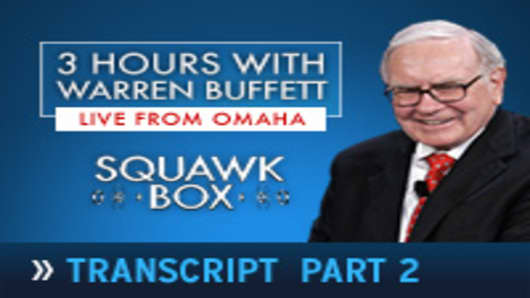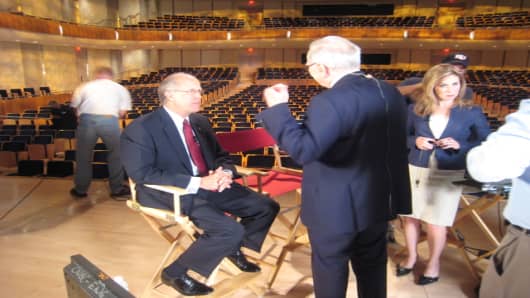QUICK: All right. Let's get to some...
BUFFETT: Where's the popcorn?
QUICK: Oh, there--they didn't provide popcorn quite this early...
BUFFETT: All right.
QUICK: ...but we do have some questions that are coming up. Let's get to the first question for Mr. Buffett.
Unidentified Man #1: Do you think there's a characteristic about American democracy that leads to American debt?
QUICK: A characteristic about American democracy that leads to American debt. What do you think?
BUFFETT: Well, there's nothing inappropriate about having debt in America. I mean, Berkshire has debt, and it's helped us grow over time. And it's when debt gets out of control that you worry. But the American democracy, it's always fun to spend a little more than you take in, and that applies to individuals, it applies to governments. And in a $14 trillion economy, having debt that's 60-odd percent of GDP is not inappropriate. It wasn't inappropriate when we had 120 percent of GDP in debt after World War II, because we had to fight a war.
QUICK: Although you can't expect to maintain deficits like that endlessly.
BUFFETT: Yeah, you can expect to maintain a deficit that's a given percentage of the GDP. I mean, Berkshire can expect to have debt forever, and the larger we get in terms of our equity and earning power, the more debt we can sustain. And I don't think our shareholders would want us to operate--take on some rule where we're going to operate debt-free in the future. So it's--what you worry about is when the debt starts spiraling out of control, when it goes up year after year after year as a percentage of GDP, because eventually when that occurs people--if you try to borrow money around the world in your own currency, the world will say no. That's what happened in South America in the past, it happened in the--in the Asian arena. We are able to borrow money in dollars. The world trusts the dollar. If we tried to run our debt up to 3- or 400 percent of GDP, nobody would want debt denominated in dollars.
QUICK: OK. Let's take another question. This one comes from Irvine, California.
Unidentified Man #2: Hey, Mr. Buffett, I would like to know what is going to happen with Fannie Mae. Are they going under?
QUICK: That was, again, what would be the best investment to hedge against the upcoming debt crisis?
BUFFETT: Yeah. Well, I would say I don't think there's going to be an upcoming debt crisis, but if you believe that fiscal activities that the government will get out of control and that we will get on a situation where the debt skyrockets, you will have, obviously, you'll have inflation--significant inflation. No government likes to pay back its debt in dollars that are equivalent to the kind they took in. The best thing you're going to have is develop your own talent. I mean, if you're the best doctor in town, if you're the best teacher in town, if you're, you know, the best salesman in town, you'll do well no matter what the currency does.
QUICK: Mm-hmm.
BUFFETT: I mean, you will get your share. So investing in yourself is always the best thing. Now, second best thing is to own products or stocks that have products that don't require much capital investment, because you don't want to be--have a lot of required capital investment during inflation; where they have very little capital investment but they are sort of a royalty on whatever the current price level is in the country. I mean, if you take--I don't know what product you might buy regularly, but what--whatever you use for your hair or...
QUICK: (Unintelligible)
BUFFETT: You're not going to change that if the price level doubles.
QUICK: Right.
BUFFETT: And if they don't have to build new plants or anything, they just ride along that curve.
QUICK: OK. And very quickly, that Irvine, California, question, I think we heard the wrong one. The Irvine question, another one he was just asking about was what's going to happen with Fannie Mae? Are they going under?
BUFFETT: Well, in a sense they've gone under in that--in that they only are existing because the federal government has said that they're going to back up their obligations, so that...
QUICK: Right.
BUFFETT: ...from a standpoint of an independent entity, it--it's--the game is over on that, pretty much. And that does not mean the Fannie debt or the guarantee on Fannie mortgages is bad. Fannie Mae's an important institution in the--in the United States. But they priced risk wrong.
QUICK: Mm-hmm.
BUFFETT: They did some things in accounting that were bad, they tried to obtain goals that couldn't be achieved, and in the--and they leveraged up to an extent that was kind of crazy and certainly was crazy to do it with the assets that they were using the leverage for. So essentially the equity got wiped out.
QUICK: OK. We're going to take a quick break right now, but folks, when we come back we're going to talk about Warren and Bill's excellent adventure. We'll get the inside story of your summer expedition with Bill Gates. You just went this week to look at the tar sands.
BUFFETT: True.
QUICK: All right. We're going to talk about all of that when we come up, and we'll be checking in with questions from more viewers across the country, too.
Unidentified Man #3: I was very curious, in your recent 10-Q, that you had not purchased any bank stocks, very surprised that you had not jumped on that in July. I was wondering how low they have to go before you're interested.




